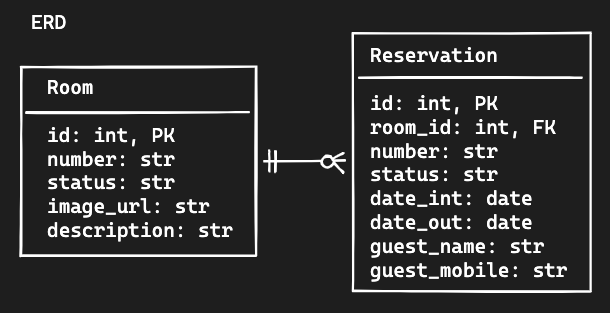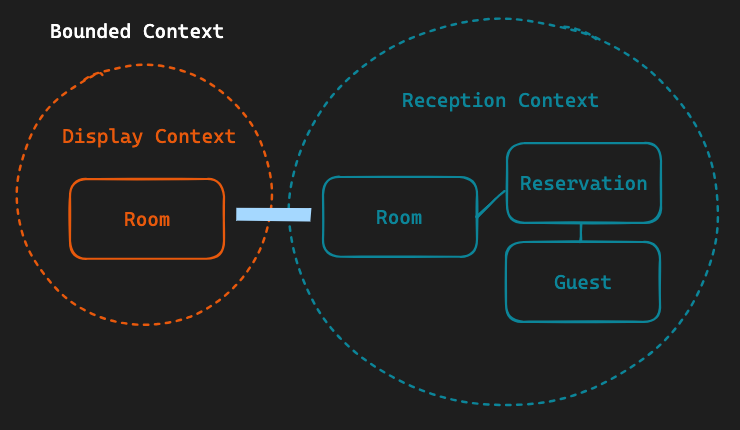I've adopted the DDD pattern for my recent FastAPI project. DDD makes it easier to implement complex domain problems. Improved readability and easy code fix have significantly improved productivity. As a result, stable but flexible project management has become possible. I'm very satisfied with it, so I'd like to share this experience and knowledge.
Using DDD makes it easy to maintain collaboration with domain experts, not only engineers.
- It is possible to prevent the mental model and the actual software from being dualized.
- Business logic is easy to manage.
- Infrastructure change is flexible.
- Let's create a simple hotel reservation system and see how each component of DDD is implemented.
- Don't go too deep into topics like event sourcing.
- Considering the running curve, this project consists only of essential DDD components.
NOTES: The diagram below represents only the database tables.
- Display(Handling tasks related to the hotel room display)
- List Rooms
- Reception(Handling tasks related to the hotel room reservation)
- Make a reservation
- Change the reservation details
- Cancel a reservation
- Check-in & Check-out
Reservation and reception can also be isolated, but let's say that reception handles it altogether for now.
src
├── reception
│ ├── application
│ │ └── use_case
│ │ ├── query
│ │ └── command
│ ├── domain
│ │ ├── entity
│ │ ├── exception
│ │ ├── service
│ │ └── value_object
│ ├── infra
│ │ ├── repository
│ │ └── external_apis
│ └── presentation
│ ├── grpc
│ └── rest
│ ├── request
│ └── response
├── display
│ ├── application
│ ├── domain
│ ├── infra
│ └── presentation
└── shared_kernel
├── domain
└── infra
├── database
├── fastapi
└── log
from dataclasses import dataclass, field
class Entity:
id: int = field(init=False)
def __eq__(self, other: Any) -> bool:
if isinstance(other, type(self)):
return self.id == other.id
return False
def __hash__(self):
return hash(self.id)
class AggregateRoot(Entity):
pass
@dataclass(eq=False, slots=True)
class Reservation(AggregateRoot):
room: Room
reservation_number: ReservationNumber
reservation_status: ReservationStatus
date_in: datetime
date_out: datetime
guest: Guest-
Entity mix-in
The entity is an object that have a distinct identity. I will implement__eq__()and__hash__(), to use it as a mix-in for dataclass. -
AggregateRoot mix-in
A DDD aggregate is a cluster of domain objects that can be treated as a single unit. An aggregate root is an entry point of an aggregate. Any references from outside the aggregate should only go to the aggregate root. The root can thus ensure the integrity of the aggregate as a whole. I will define an empty class calledAggregateRootand explicitly mark it. -
Entity Implementation
To use__eq__()fromEntitymix-in, addeq=False. From Python 3.10,slots=Truemakes dataclass more memory-efficient. -
Value Object
With sqlalchemy, you can use value objects within entity when reading & saving data from a repository. I will introduce the details later.
@dataclass(eq=False, slots=True)
class Reservation(AggregateRoot):
# ...
@classmethod
def make(
cls, room: Room, date_in: datetime, date_out: datetime, guest: Guest
) -> Reservation:
room.reserve()
return cls(
room=room,
date_in=date_in,
date_out=date_out,
guest=guest,
reservation_number=ReservationNumber.generate(),
reservation_status=ReservationStatus.IN_PROGRESS,
)
def cancel(self):
if not self.reservation_status.in_progress:
raise ReservationStatusException
self.reservation_status = ReservationStatus.CANCELLED
def check_in(self):
# ...
def check_out(self):
# ...
def change_guest(self, guest: Guest):
# ...By implementing the method according to the entity's life cycle, you can expect how it evolves when reading it.
-
Creation
Declare aclass methodand use it when creating an entity. -
Changes
Declare aninstance methodand use it when changing an entity.
NOTE: This is the most beautiful part of implementing DDD with sqlalchemy.
from sqlalchemy import MetaData, Table, Column, Integer, String, Text, ForeignKey, DateTime
from sqlalchemy.orm import registry
metadata = MetaData()
mapper_registry = registry()
room_table = Table(
"hotel_room",
metadata,
Column("id", Integer, primary_key=True, autoincrement=True),
Column("number", String(20), nullable=False),
Column("status", String(20), nullable=False),
Column("image_url", String(200), nullable=False),
Column("description", Text, nullable=True),
UniqueConstraint("number", name="uix_hotel_room_number"),
)
reservation_table = Table(
"room_reservation",
metadata,
Column("id", Integer, primary_key=True, autoincrement=True),
Column("room_id", Integer, ForeignKey("hotel_room.id"), nullable=False),
Column("number", String(20), nullable=False),
Column("status", String(20), nullable=False),
Column("date_in", DateTime(timezone=True)),
Column("date_out", DateTime(timezone=True)),
Column("guest_mobile", String(20), nullable=False),
Column("guest_name", String(50), nullable=True),
)
def init_orm_mappers():
from reception.domain.entity.room import Room as ReceptionRoomEntity
from reception.domain.entity.reservation import Reservation as ReceptionReservationEntity
mapper_registry.map_imperatively(
ReceptionRoomEntity,
room_table,
properties={
"room_status": composite(RoomStatus.from_value, room_table.c.status),
}
)
mapper_registry.map_imperatively(
ReceptionReservationEntity,
reservation_table,
properties={
"room": relationship(
Room, backref="reservations", order_by=reservation_table.c.id.desc, lazy="joined"
),
"reservation_number": composite(ReservationNumber.from_value, reservation_table.c.number),
"reservation_status": composite(ReservationStatus.from_value, reservation_table.c.status),
"guest": composite(Guest, reservation_table.c.guest_mobile, reservation_table.c.guest_name),
}
)
from display.domain.entity.room import Room as DisplayRoomEntity
mapper_registry.map_imperatively(
DisplayRoomEntity,
room_table,
properties={
"room_status": composite(RoomStatus.from_value, room_table.c.status),
}
)# call this after app running
init_orm_mappers()Because entities do not need to know the implementation of the database table, let's use sqlalchemy's imperative mapping to separate entity definitions and table definitions.
Because name conflicts can occur when mapping tables and entities, the number is replaced like reservation_number.
If you want to keep using the number as it is, you can change the original number to _number first.
@dataclass(eq=False, slots=True)
class Room(Entity):
number: str
room_status: RoomStatusEntities only need to use logically required data among the columns defined in the table.
For example, in the reservation domain, you don't need to know the image of the room, so only name, status is defined in the room.
from pydantic import constr
mobile_type = constr(regex=r"\+[0-9]{2,3}-[0-9]{2}-[0-9]{4}-[0-9]{4}")
@dataclass(slots=True)
class Guest(ValueObject):
mobile: mobile_type
name: str | None = NoneA value object is an object that matter only as the combination of its attributes. Guest A's name and mobile should be treated as a single unit, so make it a value object.
Using sqlalchemy's composite column type, it allows you to implement value objects by changing columns to an object that fits your needs when you load data.
Let's define the mix-in as follows and inherit it when implementing a value object.
class ValueObject:
def __composite_values__(self):
return self.value,
@classmethod
def from_value(cls, value: Any) -> ValueObjectType | None:
if isinstance(cls, EnumMeta):
for item in cls:
if item.value == value:
return item
raise ValueObjectEnumError
instance = cls(value=value)
return instanceIf you define the __composite_values_() method, sqlalchemy separates the object and puts them in the columns when you save the data.
NOTE: The , in the return of
__composite_value__()is not a typo.
class RoomStatus(ValueObject, str, Enum):
AVAILABLE = "AVAILABLE"
RESERVED = "RESERVED"
OCCUPIED = "OCCUPIED"
@dataclass(slots=True)
class ReservationNumber(ValueObject):
DATETIME_FORMAT: ClassVar[str] = "%y%m%d%H%M%S"
RANDOM_STR_LENGTH: ClassVar[int] = 7
value: str
@classmethod
def generate(cls) -> ReservationNumber:
time_part: str = datetime.utcnow().strftime(cls.DATETIME_FORMAT)
random_strings: str = ''.join(
random.choice(string.ascii_uppercase + string.digits)
for _ in range(cls.RANDOM_STR_LENGTH)
)
return cls(value=time_part + ":" + random_strings)ReservationNumber intentionally used the name value for a single attribute to leverage __composite_values__() in ValueObject class.
@dataclass(slots=True)
class Guest(ValueObject):
mobile: mobile_type
name: str | None = None
def __composite_values__(self):
return self.mobile, self.nameIf a value object consists of more than one column, you must override the __composite_values__() as shown above.
class ReservationStatusException(BaseMsgException):
message = "Invalid request for current reservation status."
@dataclass(eq=False, slots=True)
class Reservation(AggregateRoot):
# ...
def cancel(self):
if not self.reservation_status.in_progress:
raise ReservationStatusException
self.reservation_status = ReservationStatus.CANCELLEDBy defining and using domain exceptions, the cohesion can be increased.
FastAPI's Depends makes it easy to implement Dependency Injection between layers.
And you can achieve Inversion of control with Dependency Injector.
@router.get("/reservations/{reservation_number}")
@inject
def get_reservation(
reservation_number: str,
reservation_query: ReservationQueryUseCase = Depends(
Provide[AppContainer.reception.reservation_query]
),
):
try:
reservation: Reservation = reservation_query.get_reservation(
reservation_number=reservation_number
)
except ReservationNotFoundException as e:
raise HTTPException(
status_code=status.HTTP_404_NOT_FOUND,
detail=e.message,
)
return ReservationResponse(
detail="ok",
result=ReservationSchema.build(reservation=reservation),
)class ReservationQueryUseCase:
def __init__(
self,
reservation_repo: ReservationRDBRepository,
db_session: Callable[[], ContextManager[Session]],
):
self.reservation_repo = reservation_repo
self.db_session = db_session
def get_reservation(self, reservation_number: str) -> Reservation:
reservation_number = ReservationNumber.from_value(value=reservation_number)
with self.db_session() as session:
reservation: Reservation | None = (
self.reservation_repo.get_reservation_by_reservation_number(
session=session, reservation_number=reservation_number
)
)
if not reservation:
raise ReservationNotFoundException
return reservationclass ReservationRDBRepository(RDBRepository):
@staticmethod
def get_reservation_by_reservation_number(
session: Session, reservation_number: ReservationNumber
) -> Reservation | None:
return session.query(Reservation).filter_by(reservation_number=reservation_number).first()Pydantic makes it easy to implement the request and response schema.
class CreateReservationRequest(BaseModel):
room_number: str
date_in: datetime
date_out: datetime
guest_mobile: mobile_type
guest_name: str | None = Noneclass ReservationSchema(BaseModel):
room: RoomSchema
reservation_number: str
status: ReservationStatus
date_in: datetime
date_out: datetime
guest: GuestSchema
@classmethod
def build(cls, reservation: Reservation) -> ReservationSchema:
return cls(
room=RoomSchema.from_entity(reservation.room),
reservation_number=reservation.reservation_number.value,
status=reservation.reservation_status,
date_in=reservation.date_in,
date_out=reservation.date_out,
guest=GuestSchema.from_entity(reservation.guest),
)
class ReservationResponse(BaseResponse):
result: ReservationSchema$ uvicorn shared_kernel.infra.fastapi.main:app --reload- Python 3.10+
- 3.10 and lower versions can also take the key concepts

